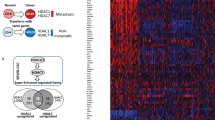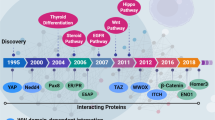Abstract
Signal transducer and activator of transcription 1 (STAT1) is activated in the inflammatory response to interferons. The MUC1 oncoprotein is overexpressed in human breast cancers. Analysis of genes differentially expressed in MUC1-transformed cells has identified a network linking MUC1 and STAT1 that is associated with cellular growth and inflammation. The results further show that the MUC1-C subunit associates with STAT1 in cells and the MUC1-C cytoplasmic domain binds directly to the STAT1 DNA-binding domain. The interaction between MUC1-C and STAT1 is inducible by IFNγ in non-malignant epithelial cells and constitutive in breast cancer cells. Moreover, the MUC1–STAT1 interaction contributes to the activation of STAT1 target genes, including MUC1 itself. Analysis of two independent databases showed that MUC1 and STAT1 are coexpressed in about 15% of primary human breast tumors. Coexpression of MUC1 and the STAT1 pathway was found to be significantly associated with decreased recurrence-free and overall survival. These findings indicate that (i) MUC1 and STAT1 function in an auto-inductive loop, and (ii) activation of both MUC1 and the STAT1 pathway in breast tumors confers a poor prognosis for patients.
This is a preview of subscription content, access via your institution
Access options
Subscribe to this journal
Receive 50 print issues and online access
$259.00 per year
only $5.18 per issue
Buy this article
- Purchase on Springer Link
- Instant access to full article PDF
Prices may be subject to local taxes which are calculated during checkout







Similar content being viewed by others
References
Ahmad R, Raina D, Joshi MD, Kawano T, Kharbanda S, Kufe D . (2009). MUC1-C oncoprotein functions as a direct activator of the NF-kappaB p65 transcription factor. Cancer Res 69: 7013–7021.
Ahmad R, Raina D, Trivedi V, Ren J, Rajabi H, Kharbanda S et al. (2007). MUC1 oncoprotein activates the IκB kinase β complex and constitutive NF-κB signaling. Nat Cell Biol 9: 1419–1427.
Chanrion M, Negre V, Fontaine H, Salvetat N, Bibeau F, Mac Grogan G et al. (2008). A gene expression signature that can predict the recurrence of tamoxifen-treated primary breast cancer. Clin Cancer Res 14: 1744–1752.
Darnell Jr JE, Kerr IM, Stark GR . (1994). Jak-STAT pathways and transcriptional activation in response to IFNs and other extracellular signaling proteins. Science 264: 1415–1421.
Deblandre GA, Marinx OP, Evans SS, Majjaj S, Leo O, Caput D et al. (1995). Expression cloning of an interferon-inducible 17-kDa membrane protein implicated in the control of cell growth. J Biol Chem 270: 23860–23866.
Der SD, Zhou A, Williams BR, Silverman RH . (1998). Identification of genes differentially regulated by interferon alpha, beta, or gamma using oligonucleotide arrays. Proc Natl Acad Sci USA 95: 15623–15628.
Gaemers IC, Vos HL, Volders HH, van der Valk SW, Hilkens J . (2001). A STAT-responsive element in the promoter of the episialin/MUC1 gene is involved in its overexpression in carcinoma cells. J Biol Chem 276: 6191–6199.
Huang L, Chen D, Liu D, Yin L, Kharbanda S, Kufe D . (2005). MUC1 oncoprotein blocks GSK3beta-mediated phosphorylation and degradation of beta-catenin. Cancer Res 65: 10413–10422.
Huang L, Ren J, Chen D, Li Y, Kharbanda S, Kufe D . (2003). MUC1 cytoplasmic domain coactivates Wnt target gene transcription and confers transformation. Cancer Biol Ther 2: 702–706.
Khodarev N, Pitroda S, Beckett M, MacDermed D, Huang L, Kufe D et al. (2009). MUC1-induced transcriptional programs associated with tumorigenesis predict outcome in breast and lung cancer. Cancer Res 69: 2833–2837.
Khodarev NN, Beckett M, Labay E, Darga T, Roizman B, Weichselbaum RR . (2004). STAT1 is overexpressed in tumors selected for radioresistance and confers protection from radiation in transduced sensitive cells. Proc Natl Acad Sci USA 101: 1714–1719.
Khodarev NN, Minn AJ, Efimova EV, Darga TE, Labay E, Beckett M et al. (2007). Signal transducer and activator of transcription 1 regulates both cytotoxic and prosurvival functions in tumor cells. Cancer Res 67: 9214–9220.
Khodarev NN, Park J, Kataoka Y, Nodzenski E, Hellman S, Roizman B et al. (2003). Receiver operating characteristic analysis: a general tool for DNA array data filtration and performance estimation. Genomics 81: 202–209.
Kimchi ET, Posner MC, Park JO, Darga TE, Kocherginsky M, Karrison T et al. (2005). Progression of Barrett's metaplasia to adenocarcinoma is associated with the suppression of the transcriptional programs of epidermal differentiation. Cancer Res 65: 3146–3154.
Krämer OH, Baus D, Knauer SK, Stein S, Jäger E, Stauber RH et al. (2006). Acetylation of Stat1 modulates NF-kappaB activity. Genes Dev 20: 473–485.
Krämer OH, Knauer SK, Greiner G, Jandt E, Reichardt S, Gührs KH et al. (2009). A phosphorylation-acetylation switch regulates STAT1 signaling. Genes Dev 23: 223–235.
Kufe D, Inghirami G, Abe M, Hayes D, Justi-Wheeler H, Schlom J . (1984). Differential reactivity of a novel monoclonal antibody (DF3) with human malignant versus benign breast tumors. Hybridoma 3: 223–232.
Lagow EL, Carson DD . (2002). Synergistic stimulation of MUC1 expression in normal breast epithelia and breast cancer cells by interferon-gamma and tumor necrosis factor-alpha. J Cell Biochem 86: 759–772.
Leng Y, Cao C, Ren J, Huang L, Chen D, Ito M et al. (2007). Nuclear import of the MUC1-C oncoprotein is mediated by nucleoporin Nup62. J Biol Chem 282: 19321–19330.
Levy DE, Darnell Jr JE . (2002). Stats: transcriptional control and biological impact. Nat Rev Mol Cell Biol 3: 651–662.
Li Y, Bharti A, Chen D, Gong J, Kufe D . (1998). Interaction of glycogen synthase kinase 3β with the DF3/MUC1 carcinoma-associated antigen and β-catenin. Mol Cell Biol 18: 7216–7224.
Li Y, Kuwahara H, Ren J, Wen G, Kufe D . (2001a). The c-Src tyrosine kinase regulates signaling of the human DF3/MUC1 carcinoma-associated antigen with GSK3β and β-catenin. J Biol Chem 276: 6061–6064.
Li Y, Liu D, Chen D, Kharbanda S, Kufe D . (2003). Human DF3/MUC1 carcinoma-associated protein functions as an oncogene. Oncogene 22: 6107–6110.
Li Y, Ren J, Yu W-H, Li G, Kuwahara H, Yin L et al. (2001b). The EGF receptor regulates interaction of the human DF3/MUC1 carcinoma antigen with c-Src and β-catenin. J Biol Chem 276: 35239–35242.
Ligtenberg MJ, Kruijshaar L, Buijs F, van Meijer M, Litvinov SV, Hilkens J . (1992). Cell-associated episialin is a complex containing two proteins derived from a common precursor. J Biol Chem 267: 6171–6177.
Loi S, Haibe-Kains B, Desmedt C, Lallemand F, Tutt AM, Gillet C et al. (2007). Definition of clinically distinct molecular subtypes in estrogen receptor-positive breast carcinomas through genomic grade. J Clin Oncol 25: 1239–1246.
Macao B, Johansson DG, Hansson GC, Hard T . (2006). Autoproteolysis coupled to protein folding in the SEA domain of the membrane-bound MUC1 mucin. Nat Struct Mol Biol 13: 71–76.
McBride KM, McDonald C, Reich NC . (2000). Nuclear export signal located within the DNA-binding domain of the STAT1 transcription factor. EMBO J 19: 6196–6206.
Meyer T, Marg A, Lemke P, Wiesner B, Vinkemeier U . (2003). DNA binding controls inactivation and nuclear accumulation of the transcription factor STAT1. Genes Dev 17: 1992–2005.
Pitroda S, Khodarev N, Beckett M, Kufe D, Weichselbaum R . (2009). MUC1-induced alterations in a lipid metabolic gene network predict response of human breast cancers to tamoxifen treatment. Proc Natl Acad Sci USA 106: 5837–5841.
Raina D, Ahmad R, Joshi M, Yin L, Wu Z, Kawano T et al. (2009). Direct targeting of the MUC1 oncoprotein blocks survival and tumorigenicity of human breast carcinoma cells. Cancer Res 69: 5133–5141.
Raina D, Ahmad R, Kumar S, Ren J, Yoshida K, Kharbanda S et al. (2006). MUC1 oncoprotein blocks nuclear targeting of c-Abl in the apoptotic response to DNA damage. EMBO J 25: 3774–3783.
Ramasamy S, Duraisamy S, Barbashov S, Kawano T, Kharbanda S, Kufe D . (2007). The MUC1 and galectin-3 oncoproteins function in a microRNA-dependent regulatory loop. Mol Cell 27: 992–1004.
Ren J, Agata N, Chen D, Li Y, Yu W-H, Huang L et al. (2004). Human MUC1 carcinoma-associated protein confers resistance to genotoxic anti-cancer agents. Cancer Cell 5: 163–175.
Ren J, Bharti A, Raina D, Chen W, Ahmad R, Kufe D . (2006). MUC1 oncoprotein is targeted to mitochondria by heregulin-induced activation of c-Src and the molecular chaperone HSP90. Oncogene 25: 20–31.
Ren J, Li Y, Kufe D . (2002). Protein kinase C δ regulates function of the DF3/MUC1 carcinoma antigen in β-catenin signaling. J Biol Chem 277: 17616–17622.
Schindler C, Levy DE, Decker T . (2007). JAK-STAT signaling: from interferons to cytokines. J Biol Chem 282: 20059–20063.
Shuai K . (2000). Modulation of STAT signaling by STAT-interacting proteins. Oncogene 19: 2638–2644.
Tusher VG, Tibshirani R, Chu G . (2001). Significance analysis of microarrays applied to the ionizing radiation response. Proc Natl Acad Sci USA 98: 10515.
Wei X, Xu H, Kufe D . (2005). Human MUC1 oncoprotein regulates p53-responsive gene transcription in the genotoxic stress response. Cancer Cell 7: 167–178.
Wei X, Xu H, Kufe D . (2006). MUC1 oncoprotein stabilizes and activates estrogen receptor α. Mol Cell 21: 295–305.
Wei X, Xu H, Kufe D . (2007). Human mucin 1 oncoprotein represses transcription of the p53 tumor suppressor gene. Cancer Res 67: 1853–1858.
Weichselbaum RR, Ishwaran H, Yoon T, Nuyten DS, Baker SW, Khodarev N et al. (2008). An interferon-related gene signature for DNA damage resistance is a predictive marker for chemotherapy and radiation for breast cancer. Proc Natl Acad Sci USA 105: 18490–18495.
Yin L, Kharbanda S, Kufe D . (2007). Mucin 1 oncoprotein blocks hypoxia-inducible factor 1 alpha activation in a survival response to hypoxia. J Biol Chem 282: 257–266.
Yin L, Kufe D . (2003). Human MUC1 carcinoma antigen regulates intracellular oxidant levels and the apoptotic response to oxidative stress. J Biol Chem 278: 35458–35464.
Yu H, Jove R . (2004). The STATs of cancer—new molecular targets come of age. Nat Rev Cancer 4: 97–105.
Acknowledgements
This work was supported by Grants CA97098 and CA111423 awarded by the National Cancer Institute.
Author information
Authors and Affiliations
Corresponding author
Additional information
Supplementary Information accompanies the paper on the Oncogene website (http://www.nature.com/onc)
Rights and permissions
About this article
Cite this article
Khodarev, N., Ahmad, R., Rajabi, H. et al. Cooperativity of the MUC1 oncoprotein and STAT1 pathway in poor prognosis human breast cancer. Oncogene 29, 920–929 (2010). https://doi.org/10.1038/onc.2009.391
Received:
Revised:
Accepted:
Published:
Issue Date:
DOI: https://doi.org/10.1038/onc.2009.391
Keywords
This article is cited by
-
MUC1 is a potential target to overcome trastuzumab resistance in breast cancer therapy
Cancer Cell International (2022)
-
The mechanism of how CD95/Fas activates the Type I IFN/STAT1 axis, driving cancer stemness in breast cancer
Scientific Reports (2020)
-
Dependency on the TYK2/STAT1/MCL1 axis in anaplastic large cell lymphoma
Leukemia (2019)
-
CAR T cell therapy for breast cancer: harnessing the tumor milieu to drive T cell activation
Journal for ImmunoTherapy of Cancer (2018)
-
MUC1-C activates polycomb repressive complexes and downregulates tumor suppressor genes in human cancer cells
Oncogene (2018)



